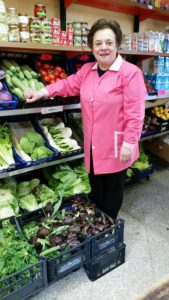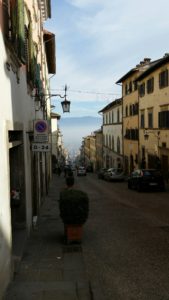Arriving in Anghiari, December 2016
It was a beautiful clear winter’s day yesterday, when I arrived in Italy. On the train from Rome to Arezzo, I thought again about the quality of this winter light, and how different it is from any light-and-landscape in Australia. I find it achingly beautiful, if perhaps melancholy: the hills with that mix of olive, cypress, and late autumnal deciduous tones in a low deep sunlight. I can’t take my eyes off it.
Arriving in Arezzo, I am thrown into a busy Saturday lunchtime, and the slightly chaotic practicalities of the Avis office and manoeuvring a car into Italian city traffic. But it is in the Avis office that I again encounter the sense of welcome that I experience here. Paolo, the Avis man, who lives in San Sepolcro, and who is said to have the eyes of Piero Della Francesca’s San Giuliano, always remembers me. He greets me warmly and, this time, gives me contacts in Anghiari. First, a cousin who is a butcher, and, I note, a woman. (I haven’t been to this butcher’s shop before because it is at some distance, at the bottom of the hill, in the Tiber valley, but I have heard that it is very good. There are at least three excellent butchers in this town of some 7,000 people.) Second, a friend, an artist who has a shop in the mediaeval part of town. This prompts a conversation about young people, and whether they stay or leave small towns around here. Stay, he says, insistently. This isn’t the common Italian pattern. I want to learn more about what happens in this place.
The final point of the long journey from Australia is the turn into Corso Matteotti, the street where I stay. This is the main Renaissance street of Anghiari, which becomes the straight road down the hill, across the Tiber valley, to San Sepolcro. Suddenly, there is a breathtaking view. And, on arrival, yesterday, the bells were ringing as I turned the corner. Late in the afternoon, the time when the town comes to life again, I headed out to do a food shop. This has become, over the years, my arrival ritual. But, the welcome I received this time was particularly pronounced, perhaps because I have returned after only a year. It did feel like a homecoming.
 I went into three shops and, in each, I had a similar experience. It is interesting that this happens particularly when food shopping. The first shop that I went to is the unassuming ‘supermarket’ that I described in my first Anghiari blog last year. This time as I enter, the elderly couple who own the shop not only greet me with big smiles, but they come from behind the counter to hug me. I am shocked to hear that this is the last evening that they will be open. They are getting on, and their daughter doesn’t want to keep the shop going, so they are selling. Now I see that the shelves are empty. Nevertheless, there is still some local pecorino and prosciutto to be had, as well as their own delicious olive oil. They press upon me crostini with this oil, and offer me a coffee. I am again struck by their generosity. I am glad to have been able to see them again, even if sad to see the shop empty. Somehow you don’t expect things to change here: I had just assumed that shop would always be there!
I went into three shops and, in each, I had a similar experience. It is interesting that this happens particularly when food shopping. The first shop that I went to is the unassuming ‘supermarket’ that I described in my first Anghiari blog last year. This time as I enter, the elderly couple who own the shop not only greet me with big smiles, but they come from behind the counter to hug me. I am shocked to hear that this is the last evening that they will be open. They are getting on, and their daughter doesn’t want to keep the shop going, so they are selling. Now I see that the shelves are empty. Nevertheless, there is still some local pecorino and prosciutto to be had, as well as their own delicious olive oil. They press upon me crostini with this oil, and offer me a coffee. I am again struck by their generosity. I am glad to have been able to see them again, even if sad to see the shop empty. Somehow you don’t expect things to change here: I had just assumed that shop would always be there!
Then, off to the butcher’s. Again, the husband and wife who own this shop immediately come around the counter to welcome me with hugs (note that here is another woman butcher). When their son enters a little later, he greets me warmly, but is more formal. I am definitely ‘signora’ to him, which I presume is a matter of respect for age. (This shop doesn’t seem to be in any danger of closing as the next generation is very much involved in the family business.) I learn that the date of the annual pork festival has been changed, and that this year there will be two pigs. I buy some of their homemade ravioli for dinner, taking instructions on how to reheat it, and am encouraged to return at 11 in the morning when they will have roasted quails. As it turns out, it’s not only quails, but duck, pigeon, chicken, pheasant. This is a Sunday ritual. Yes, I return.
And, my final destination is Letizia’s fruit and vegetable shop. It is interesting to note that I don’t even know the names of the people in the other shops, and yet there is a sense of warm connection. This is not unusual in Italy; knowing people’s names is not the priority it is in our culture. In the case of Letizia, we have established the use of the informal ‘you’ between us. She is always very happy to see me (and is also very encouraging of my Italian). This time she can’t stop hugging me. During my stays, I buy her vegetables on an almost daily basis, as people do here. The vegetables are local and extraordinarily fresh, boxes of purple artichokes, cavalo nero, spinach coming in every day. Food is so important in this culture. And, in all sorts of ways, it connects people. It connects me with this community.
Letizia advises me to buy only what I need for dinner, as I am clearly tired. Afterall, she will see me tomorrow.

bongiorno Anni…I will enjoy reading about your time in Anghiari…happy holidays and a good Christmas to you…G xxx
Brava! Reading this, having been there with you last year, is very nostalgic for me. I have a tear in my eye experiencing vicariously the exquisite pleasure of arriving in such a beautiful congenial place. Thanks Ann.x
Dear Ann,
I am so glad you emailed and reminded me to check in on our blog. That is a wonderful post and I feel both hopeful and grateful reading it. I think you are right about food and social connection. It isn’t simply the hospitality that comes with sharing food. I think it’s because food (especially fresh produce) invites touch and smell and conversation (these smell ripe, these feel firm, how should I cook with this etc). I imagine the butcher shop as a place where you can become very involved in the procuring of meat. I recall that the cut of an animal, how it is to be prepared by the butcher, how it is best cooked, were pretty tailored conversations (back when I ate meat and had a local butcher who cut the meat for you). They felt both, general (everyone passes through here with similar questions), and yet, also, very specific (to me, and you, here and now).
that is exactly how the experience feels Demelza! So far from supermarket culture.
Ann